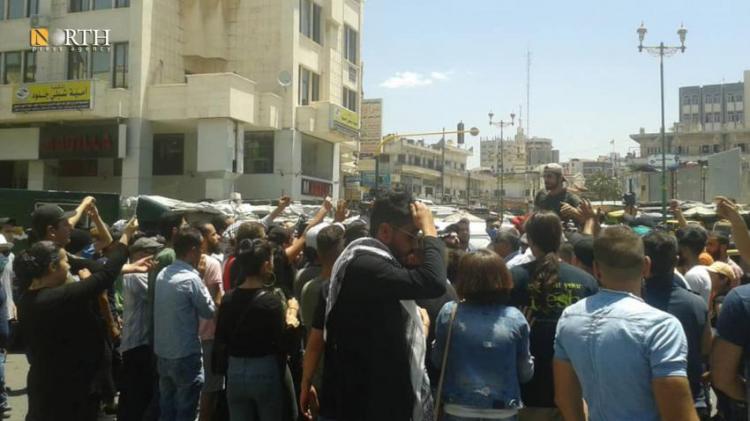Syrian regime failure to achieve reform prompts Suwayda protests: Syrian activist
SUWAYDA, Syria (North Press) – Fadhil Nawfal, a member of the Syrian Democratic Committees (a group of activists and politicians inside Syria opposed to the Syrian regime), described the recent development of protests in the city of Suwayda demanding the departure of the Syrian President Bashar Assad as a natural situation due to deteriorating economic conditions in the country and the failure of the Syrian government to achieve general reform.
Nawfal said in statements to North Press on Thursday that “there is a new character to the popular movement. The tragic economic situation, starting with the collapse of the Syrian pound, the cutoff of basic materials, and the dire situation of the health and education sectors is pushing the people to carry out demonstrations demanding their right to live."
He adds that this right depends on the reform of all state institutions, starting from the economic, educational, service to political ones, though the regime has failed to achieve it. Moreover; it has destroyed the existing ones, and it is primarily responsible for its destruction.
"In light of the persistence of corruption, bribery, and the control of the security services over the people, which the country has suffered since 1970, this regime must be overthrown," Nawfal said, noting that people are entitled to demonstrate the percentage of people living below the poverty line has reached 85%, while very few control the country's capabilities.
He noted that the Suwayda demonstrations are peaceful and bring the country back to 2011, as evidenced by the protesters' slogans of "You strangled us, we want to live.”
Nawfal said that Suwayda governorate, like the rest of Syria's areas, paid for its demonstrations, where more than 50 young people are being tortured.
He added that Suwayda witnessed a rare revolutionary military situation during the years of war, as the Battalion of Sultan Basha al-Atrash, an armed Syrian rebel group led by Khaldoun Zainalddin affiliated with the Free Syrian Army that operated in southern Syria refused to fight in the areas where civilians are present. The Sheikh al-Karama Forces, an armed group based in Suwayda governorate composed of Druze locals, refused to protected young men called for mandatory military service in the Syrian army after they refused to fight in other areas of Syria. From the beginning of the Syrian crisis, Suwayda received IDPs from other areas of Syria.
"Suwayda did not participate as strongly as the rest of the provinces at the beginning of the movement, because it has a Druze majority, which is a minority within the Syrian fabric and has its own concerns," Nawfal said.
He pointed out that there are three Sheikhs of Akl, including Sheikh al Akl al-Hanawi who is closer to supporting people in their right to demonstrate and demand rights, but at a distance with the government; however, with the huge spread of sectarian slogans, the sheikhs supported the state army and the regime.
Nawfal thinks that this is due to their fear of any change that may be surprising to them, especially after the remarkable spread of the Salafist ideology in Syria.
"The subordination of the religious leaders to the government affects the popular movement, and if the spiritual leadership of Akl Sheikhdom of the Druze Unitarian Community had a clear position, there would be greater numbers of demonstrations. This is evident in the recent statement of the Akl Sheikhdom regarding the economic reality and demanding the government assume its responsibility, which has reassured the people.”
Nawfal believes that the regime's stance towards the demonstrations taking place in Suwayda is evident through audio leaks from the official of the National Union of Syrian Students in the governorate, in which he asked students and workers in the education sector to participate in a pro-government march under the threat of dismissal.
He considered the Syrian regime uses the threat of unemployment against citizens, as there are dozens who have been dismissed from their jobs in Suwayda in addition to students who have been dismissed from their schools and universities during the past years, which has been a policy since 1970.
Nawfal said, “the youth have a full awareness of not escalating, as this is what the regime wants – to turn it into an armed clash. The youth are keen on civil peace, and all that the regime might do to create a clash will be confronted with awareness to not move backwards.”
The first sit-in took place in front of the governorate building in Suwayda on May 31, during which protesters demanded that the Syrian government take responsibility for deteriorating living conditions, control high prices and protect crops from fires.
The sit-in erupted again in front of the governorate building and in the city's roundabout on Sunday, protesting against the Syrian government's failure to improve the country's economic reality. After that, protests continued on a daily basis, shifting its demands from improving living conditions to demanding the departure of Syrian President Bashar Assad.

